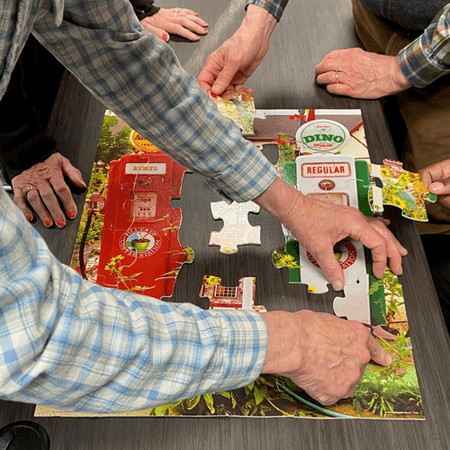
10 Steps to Take Now for Better Brain Health
It’s never too late or too early to incorporate healthy habits. Evidence shows when we incorporate these habits, we have a better chance of reducing cognitive decline. In recognition of Older Americans Month we are sharing 10 things you can do now to promote better brain health!
1. Stop Smoking
Smoking increases risk of cognitive decline. Quitting smoking can reduce risk to levels comparable with those who have not smoked.
2. Take care of your heart
Risk factors for cardiovascular disease and stroke – obesity, high blood pressure and diabetes – negatively impact your cognitive health. Please visit your doctor for regular check ups to help control or prevent these diseases.
3. Protect your brain
Brain injury can raise risk of cognitive decline and dementia. Wear a seat belt and use a helmet when playing contact sports or riding a bike. Have good lighting in your home and have open walking space in your home to prevent falls.
4. Healthy eating choices
Eat a balanced diet that is higher in vegetables and fruit to help reduce the risk of cognitive decline. There are many diet options. It is important to check with your doctor if you have any health issues to make sure a new diet is safe for you.
5. Sleep (and healthy sleep!)
Not getting enough sleep may result in problems with memory and thinking. Some tips to help promote good sleep: turn off technology in your room, have a cool dark place to sleep, have a constant bedtime, do not eat large meals prior to sleeping, and exercise daily.
6. Self-care and mental health awareness
Some studies link depression with cognitive decline so seek treatment if you have depression, anxiety, or stress. Some self-care tips for stress and anxiety: exercise, mediation, support group, stay hydrated, eat healthy, try and get outside and get vitamin D regularly.
7. Socializing with others
Staying socially engaged may support brain health. Find ways to be part of your local community or share activities with friends and family. Some examples: senior centers, adult day centers, faith communities, memory cafes, sports, community centers.
8. Brain stimulation and exercises
Challenge your mind. Build a piece of furniture. Play games of strategy, like bridge, wordle, crosswords, sudoku, word search, solitaire, trivia, etc.
9. Cardiovascular exercise
Engage in regular cardiovascular exercise that elevates heart rate and increases blood flow. Studies have found that physical activity reduces risk of cognitive decline. Try and get 120 minutes of cardiovascular activity a week.
10. Learn something new
Formal education will help reduce risk of cognitive decline and dementia. Take a class at a local college, community center, library, or online.
Blog
"I like that IMCC focuses on dementia-related problems and provides a focal point for families to network and socially interact in coping with dementia. It provides a community that helps us in our struggle."







